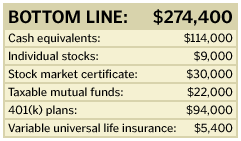
NEW YORK (CNN/Money) - Rich and Cathy Whalen have worked hard for their wealth. But they didn't do it alone.
The Wilmington, Del. couple say they got a head start in life through the lessons they learned from their parents.
Take Cathy, 28, who remembers a series of summer jobs she had as a kid -- beginning the summer she was 11. She followed in the footsteps of her parents, Italian immigrants who arrived in the U.S. knowing no English, but worked and saved enough to provide private school, college and graduate school for their daughter, and retire comfortably, as well.
Rich, 29, says he quickly learned the value of a dime as the eldest of 6 kids. When he was 14, he started a paper route; then he picked up a second job at a supermarket. "My father worked a lot, but always had time for us," Rich said. "Still, anything I wanted outside of clothing I had to pay for myself."

They Whalens are still working hard. In fact, they met in 1997 at a pharmaceutical company where they still work today. Cathy works in drug development, as a clinical study project manager. Rich is a systems engineer in the information technology department.
After being married just two years, they boast a bottom line of $274,000 -- not including the $138,000 they hold in home equity. The Whalens bought a fixer-upper for $190,000 in 1999, before getting married, and have done much of the work on it themselves. Now, similar homes in their area sell for about $300,000, Rich said.
Although both brought assets to the marriage, Rich and Cathy buckled down even further after tying the knot: they hired a financial advisor, to help plan future investments. At that point, most of their money sat in savings accounts and certificates of deposit (CDs).
"We really wanted someone to tell us how to make our money work better," Rich explained.
Rich had always maxed out his 401(k) and now has about $69,000 in his plan. Cathy, who was more conservative, resisted until the financial advisor sold her on the idea. Today, she too maxes out her plan which now holds $25,000.
The Whalen's American Express Financial Advisor also helped them divvy up their monthly take-home pay of $7,000 -- that's after taxes, insurance costs and retirement plan contributions. Today, they have 3 separate checking accounts -- call them his, hers and theirs -- with a total value of about $50,000. They each contribute $500 a month to a joint checking account which pays for the mortgage, utilities and other combined expenses.
Another $500 a month goes to taxable mutual fund accounts. And they have $22,000 in an American Express money market account, which is also being allocated into taxable mutual funds. Currently, their mutual funds total $40,000.
In addition, $650 a month goes to their life insurance policies, one valued at $500,000 for Rich, and one at $300,000 for Cathy. The $5,500 they've invested so far in variable universal life insurance policies grows tax-free, and can be used in 10 years, when withdrawals are taxed. They'll use this money when their income decreases, either when they retire or when they have kids, if Cathy decides to work less.
The rest goes into their personal accounts.
"That way, we each keep our freedom when it comes to individual expenses," Rich explained.
The Whalens still know how to get out and have fun, however -- their forward-looking financial plan includes enough to splurge each year on an elegant vacation. (For their honeymoon, they rented an entire island in the Florida keys. Not too shabby.)
Rich and Cathy keep bags of money in cash and cash equivalents, but their advisor made them less gun-shy about investing in the stock market. Rich says his strategy is to invest in what he knows. Currently, his Ameritrade account holds about $9,000 in shares of Cisco, the Gap, and Home Depot, among others.
"After we bought our house, I was buying tools and stuff for the house -- I bought the stock after I spent a lot of time there, during the remodeling," he explained.
Still, they don't want all their assets tied up on Wall Street: since they've only been investing for a year, they want to keep some money available in case they decide to buy a second property, either a vacation or retirement home.
Finally, the Whalens hope their home gets a bit more crowded before too long: they hope to have children. After all, they've already started saving in their life insurance policy to send them to private school and college. With any luck, they'll pass on their good financial sense to the next generation, too.

|

